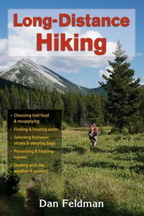Do you dream of hiking one of the big trails some day, spending four, five or even six months out in the mountains far from civilization, walking every day through the bountiful beauty of the wilderness for several thousand miles? Sounds ideal, perhaps even romantic, doesn’t it?
The reality is, however, that long distance hiking is hard, sweaty work much of the time, never mind lonely and even downright boring, and a steady string of physical, mental and environmental challenges will try hikers at every step. Seasoned hikers understand this fact, while ambitious beginners and others untested by the long trail lack the benefit of that all-important experience.
A new book on the hiking scene attempts to provide much of this hard-earned, trail-tested know-how so aspiring hikers can approach a long-distance hike with the nuts-and-bolts details on what it actually takes to see a big trail hike through to completion while enjoying the trek as thoroughly as possible.
Veteran hiker Dan Feldman, a pediatric physical therapist from Bowdoinham, has through-hiked the entire Appalachian Trail, the Pacific Crest Trail and a sizable chunk of the Continental Divide Trail.
Feldman took the many lessons he learned on these big hikes, conducted extensive medical research on health and hiking, and surveyed hundreds of long-distance hikers for their on-the-ground experiences, putting it all into a book entitled “Long-Distance Hiking” (Stackpole Books, $16.95, 240 pages).
“There are a lot of hiking books out there, the personal narratives, encyclopedic how-to books and trail specific books,” said Feldman. “What was missing was something specific to long-distance hiking that addressed the real problems hikers face on the trail.”
Designed to give prospective hikers a reasonable leg up, Feldman’s book provides the tools necessary for a more satisfying hike with fewer surprises. No book can relieve the inevitable discomfort, cold, hunger, aches and pains, but some advance knowledge can at least prepare hikers with the awareness and information to deal with these and other problems out on the trail.
“I wanted to create a buyer’s guide of sorts on preparation and prevention,” Feldman said. “If you know about an issue then you’re more likely to recognize how to handle it.”
Eleven highly readable chapters cover the range of what you need to know: Choosing trail food and resupplying; selecting footwear, stoves, sleeping bags and water treatment; preventing and treating injuries; dealing with weather and animals; managing a hiking budget; keeping the right frame of mind and much more.
It’s the discussion of the on-trail skills so important to long-distance hiking that makes Feldman’s book so valuable. From a technical standpoint, for example, as much as 5,000 calories a day are needed to power a long-distance hiker, so carrying enough high-calorie value food is critical so you don’t run out of gas or, worse, go hungry. Psychologically, if you have the right mental preparation and are ready for bad things to happen, then those sore knees, blisters or shivering nights are less likely to impact your hike. And from a practical perspective, if you set realistic goals and can be flexible and take things in stride then you’re more likely to enjoy yourself.
“The rain will happen,” concedes Feldman, “but the sun always comes out eventually.”
Attrition rates range between 80 to 90 percent among long-distance hikers who most often fail because of weather, injuries, loss of interest and insufficient funds, according to Feldman.
It can take anywhere from $3,000 to 7,000 to see you through a big hike, but equally important is something money can’t buy: stick-to-it-iveness. You’ve got to have an overarching desire to keep going, to really want to finish.
Feldman’s book will go a long way toward helping long-distance hikers realize a positive and personally fulfilling trail experience, so buy it, read it and get planning your backpacking adventure of a lifetime.
Carey Kish of Bowdoin is an avid hiker and editor of the AMC Maine Mountain Guide. Send comments and hike suggestions to:
MaineOutdoors@aol.com
Copy the Story LinkSend questions/comments to the editors.




Success. Please wait for the page to reload. If the page does not reload within 5 seconds, please refresh the page.
Enter your email and password to access comments.
Hi, to comment on stories you must . This profile is in addition to your subscription and website login.
Already have a commenting profile? .
Invalid username/password.
Please check your email to confirm and complete your registration.
Only subscribers are eligible to post comments. Please subscribe or login first for digital access. Here’s why.
Use the form below to reset your password. When you've submitted your account email, we will send an email with a reset code.